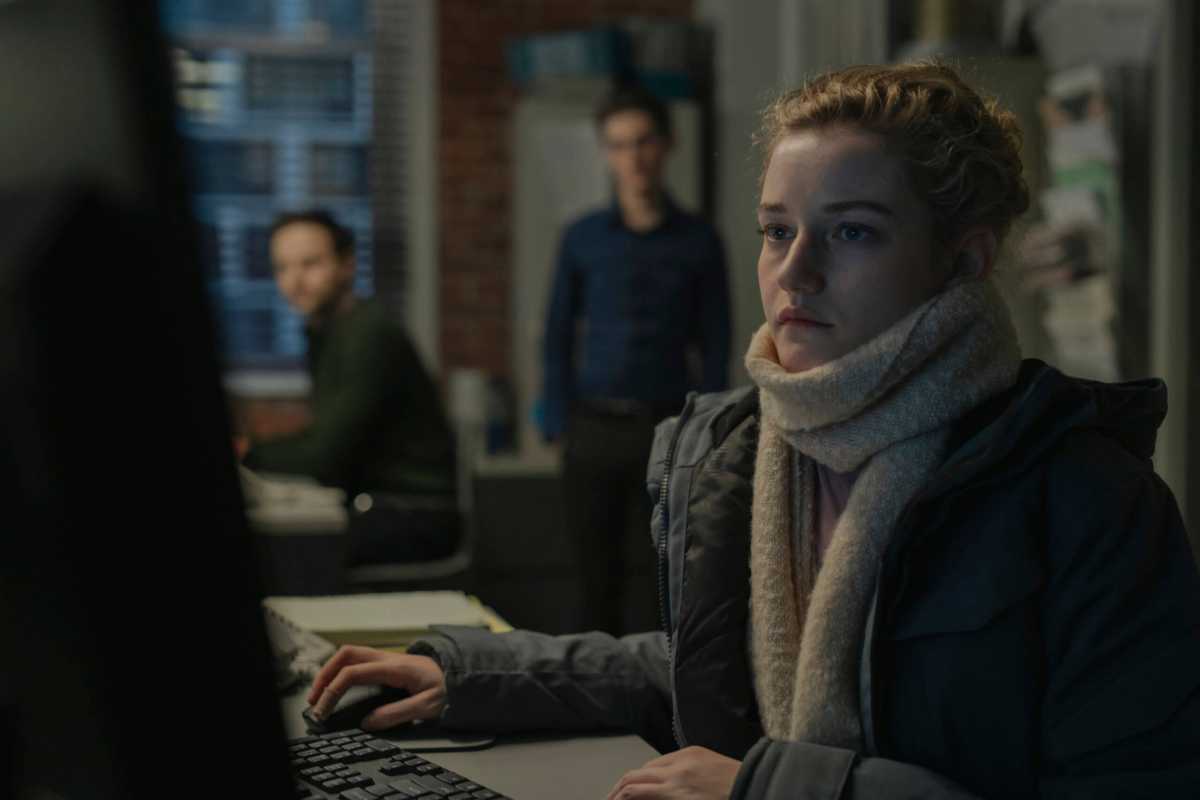Leslie Schatz’s sound design is the true star of “The Assistant.” Kitty Green’s film is at least as much an audio experience as a visual one. Although not relaxing, much less likely to induce warm tingles, its soundtrack was mixed into near-ASMR vividness. The hubbub of office life is turned into a presence that the audience can’t tune out, even when the characters’ speech consists of the muttered details of busywork. The soundtrack sometimes combines as many as three voices, for the aural equivalent of a close-up in soft focus with actors blurred into the background.
There’s a laser-directed purpose behind all this. “The Assistant” depicts the banality of menial labor in the office of a movie studio, then reveals how much of it is designed to cover up the sexual abuse committed by its Harvey Weinstein-like head. But its tone is cool rather than angry. Green fuels her depiction of a woman’s life through the influence of Chantal Akerman’s “Jeanne Dielman.” “The Assistant” also evokes other films devoted to women’s menial labor like Benoît Jacquot’s “A Single Girl” and Lila Avilés’ “The Chambermaid.”
“The Assistant” is set over the course of one long day. Jane (Julia Garner) aspires to produce films, but she has recently graduated from college and needs to break into the industry. So, she gets up in the middle of the night to go to work, with duties that include printing out a list of the weekend’s box office revenue, ordering office supplies, and opening boxes of bottled water. On the phone, the company’s boss yells at her. She complaints to HR head Wilcock (Matthew McFadyen) about the behavior to which other women are subjected to, but he gaslights her, suggesting she’s complicit in the atmosphere of abuse. The new receptionist, who moved from Idaho to New York to accept her job, seems to be the next target of the boss’ sexual harassment.
Jane is named for Jane Doe. If Green’s script suggests anonymity, the rest of the characters are cyphers. (Two characters are simply called “Male Assistant 1 and 2” in the credits.) She’s not friendly with anyone else in the office. Men and women wander in and out, unnamed and unexplained. One can read something menacing in the sound of her male colleagues laughing on the phone, but who knows what they’re actually listening to? Garner’s casting echoes her role in the TV series “The Americans,” where she played a teenage girl being manipulated with drugs by an older man to get access to her CIA agent father’s files.
Green’s camera often adopts Jane’s point of view. It looks up at New York’s tall buildings as Jane does. (She rides into Manhattan from Astoria.) It also looks down when she does office tasks. However, it keeps its distance. “The Assistant” is careful never to sexualize or objectify Jane. But it frequently films her in long shot, from a static camera reflecting a more voyeuristic perspective. Jane herself becomes a voyeur at the end, looking up at her office for a glimpse of her boss’ behavior.
Green carefully thought about the implications of form for her story. She avoids devices like music; the closing credits mention composer Tamar-kali, but unless I missed something she only contributed the cello piece that plays at the very end. One can’t exactly say the film avoids manipulating the spectator, but it creates a buzz of tension without giving us access to the world it depicts. There’s an enormous amount of offscreen space at work here, but “The Assistant” shies away from directly showing the most powerful man. One of the first artistic responses to the #MeToo movement was a one-man play written, directed, and acted by Steven Berkoff as Harvey Weinstein. David Mamet went on to write “Bitter Wheat,” in which John Malkovich also plays a Weinstein-like abusive studio head. “The Assistant” goes far to avoid the danger of making evil men attractive by turning them into anti-heroes in the name of understanding them.
Green’s background lies in documentary. She has depicted the Ukrainian feminist group FEMEN and the cultural significance of JonBenét Ramsey’s life and disappearance. The script for “The Assistant” reflects that grounding; she based it on extensive research, not just one woman’s story. Nor did Green solely investigate the film industry. If “The Assistant” refuses to show the violence depicted by powerful men directly, the movie spreads it out across the entire landscape. This is not a simple story about one bad apple abusing a woman; it shows a system where business is organized so that people are complicit in rape culture and unable to confront it without losing their jobs. The emphasis on the grind of office life hints at something even larger. “The Assistant” connects a culture that expects people to devote their lives to work while being treated like crap with the way the 1% abuse their power in every realm they can.
THE ASSISTANT | Directed by Kitty Green | Bleecker Street Media | Opens 31 | Angelika Film Center, 18 W. Houston St. at Mercer St.; angelikafilmcenter.com/nyc



































